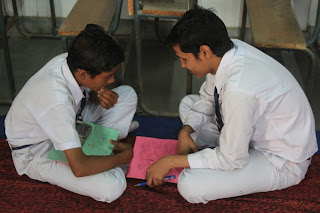“The identity of one changes
with how one perceives reality”~ Vitu Jeyaloganathan
But what exactly is
this reality? - The one that we see, understand, believe or what society,
educational institution, our family or friends builds it! It is crucial for one
to have conversation with one own self to understand his/her own identity which
more or less makes the person that we are. The second intervention with the
boys from the government school in Dwarka began with the first session on “Identity”.
After the energizer and
agreements, the participants were given a sheet of paper having questions on “myself”
which ranged from favorite food, to their dreams to their likes and dislikes
and others. This was followed by inviting the participants to draw their “identity
map” where in they were supposed to write the words, feelings, thoughts
associated with them. Unlike the previous intervention which also involved all
boys group, here only one pair came together on the shared identity of “boy”
which left me wondering about how strong is ‘gender identity’ for the boys?
Few of the interesting
things came up while the participants shared their identity maps with the large
circle.
“I help my mother in
household work”
“I am very scared of
the teachers in the school”
One of the participant
addressed his parents as “Mere priyay mataji… mere priyay pitaji..”
“I felt really good
sharing things about myself in front of everyone”
“I was scared and
little overwhelmed as to whom I would be pairing up with, how will I talk?”
“Between us, except for
three things everything was same. It was interesting to talk on how similar we
are. I didn’t know this though we are in same class”
“I felt sad that no one
was paired with me.”
Then it was explained
to the participants how the identity is not stable/stationary it keeps changing
with the age and phases of life. In order to explain how important is to
question and understand identity during adolescence, we shared the story of “Mahatma Gandhi’s adolescence” Another interesting activity followed, where
in each participant had a chance to share one positive quality about themselves
in the larger circle. Sharing positive aspects is not that easy which was
clearly indicated here, as most of the participants ended up sharing how good
they are in studies and how much they like studying and it was only after a
round and 2, few of them shared that – they like drawing, dancing, playing
cricket etc.
In the last activity,
the participants were divided in pairs where they were supposed to ask 6
questions to each other, helping them to know each other and then present their
partners in the larger circle. It was very interesting to see how creatively
they introduced each other, it seemed that each had a unique friend and they
knew each other really well.
This group is very different from the last set
of participants, they are little shy, wanting to share but something seems to
stop them however once again I could understand how important it is to talk
about oneself and yes it does bring to reality.








No comments:
Post a Comment